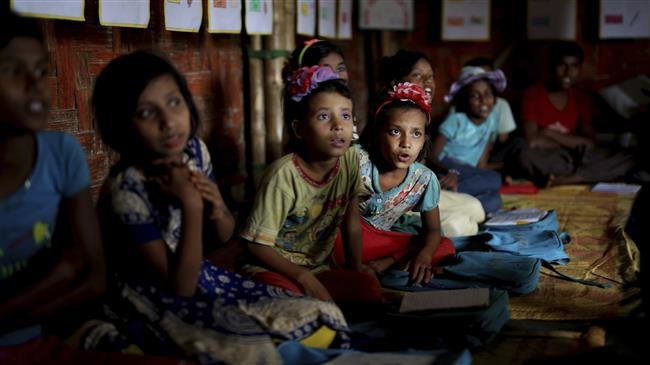
RNA - The Guardian reported on Wednesday that Bangladeshi paramilitary troops, police, and army have been deployed in southeast Bangladesh’s Cox’s Bazar district, where the Rohingya are cramped in refugee camps, to make final preparations to start sending back the first group of the minority Muslim refugees to Myanmar on Thursday.
The British daily said it had seen and could verify a video in which a Rohingya leader in Chakmarkul Camp is seen saying he was beaten in the office of Bangladeshi camp officials, known as CICs, “with a large stick” when he refused to provide them with a list of Rohingya in his camp on Monday.
“They stepped on my neck, I could not stand it,” Ullah said in the footage. “You can see from my face how I was beaten.”
It also quoted other refugees as saying they were reluctant to go back and afraid of the military presence.
“The army is in every corner of the Jamtoli and Hakimpara camps, sitting and checking people and not letting them move between camps,” one Rohingya refugee in the Jamtoli camp said.
“People are too afraid to leave their houses or eat. Some left our block at midnight using secret paths for other camps, especially Kutupalong, where there is not so much fear about repatriation,” the refugee added.
Myanmar and Bangladesh announced earlier this month that they were going to start implementing a previous repatriation agreement in mid-November.
The announcement prompted human rights groups, aid agencies, and many governments to raise concerns about safety issues for Rohingya back in Myanmar.
More than 700,000 Rohingya refugees have fled to Bangladesh since last year, when Myanmar’s armed forces, backed by Buddhist extremist mobs, intensified a crackdown that had already been underway against the Muslim community in Myanmar’s Rakhine State.
Thousands of Rohingya Muslims were killed, and others only survived by fleeing to Bangladesh, where they now face potential violence as well.
This is while Bangladesh’s foreign secretary and refugee commissioner have several times offered assurances that they would not send the Rohingya back against their will.
Dozens of Rohingya families, who were placed on a list of 2,200 refugees “approved” for return by Myanmar, told The Guardian that they did not want to return under the current conditions.
Many had already fled the camps and gone into hiding, while others had attempted suicide over fears of going back to Myanmar.
The United Nations (UN) has repeatedly warned that the repatriation of the Rohingya could be dangerous, given that they still faced violence in Myanmar. Last week, UN Special Envoy for Myanmar Yanghee Lee said the people were still facing a “high risk of persecution.”
UN demands halt to repatriation
UN human rights chief Michelle Bachelet has, meanwhile, called on Dhaka to halt the repatriation, warning that the Muslims’ lives would be at “serious risk.”
“Forcibly expelling or returning refugees… would be a clear violation of the core legal principle of non-refoulement,” Bachelet said on Tuesday.
She explained that the legal principle “forbids repatriation where there are threats of persecution or serious risks to the life and physical integrity or liberty of the individuals.”
Suu Kyi once again refuses to shoulder responsibility over Rohingya
Meanwhile, Myanmar’s de facto leader, Aung San Suu Kyi, who has been blamed by the international community for inaction over the plight of the Rohingya, has once again refused to take responsibility.
According to Press TV, US Vice President Mike Pence told her on the sidelines of a summit in Singapore on Wednesday that the violence against and the persecution of the Rohingya was “without excuse.”
Suu Kyi responded by saying, “Of course people have different points of view.”
She has already taken the side of the military in the violence against the Rohingya.
Amnesty International on Monday stripped Suu Kyi of its most prestigious human rights prize over her failure to speak out about violence against the Rohingya, calling her posture a “shameful betrayal.”
847/940